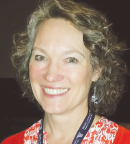WHETHER THEY are parents themselves or dealing with their own parents, patients with cancer often look to their health-care team to help guide these relationships, but data on how best to help are lacking, according to two poster presentations at the 2018 American Psychosocial Oncology Society (APOS) Annual Conference.

Cindy Moore, PhD
Cindy Moore, PhD, of Massachusetts General Hospital Cancer Center in Boston, reported on the “breadth and complexity of parenting concerns in adults with cancer seeking a parent guidance consultation, with implications for developing programs to reduce parental distress and address children’s needs.”1
In a separate study, Maija Reblin, PhD, of Moffitt Cancer Center in Tampa, described the expected roles of parent and partner caregivers in supporting young adult cancer patients.2

Maija Reblin, PhD
What Parents Worry About
“CHANCES ARE everyone in this room has either shown off pictures of their children or admired pictures of someone else’s children,” Dr. Moore said during her presentation. “When a parent with cancer shows their [children’s] pictures, the importance of their parenting role becomes clearly visible.”
Cancer patients with children can have increased motivation to endure difficult treatment but may also be concerned about the emotional impact of the illness on their offspring. The magnitude of concerns about children can be related to higher levels of distress, anxiety, and depressive symptoms in the parent, as well as declines in parenting efficacy, she added.
“We know that some parents struggle to communicate with children about a cancer diagnosis and would welcome help in doing so,” Dr. Moore said. “We lack anything approaching a detailed or nuanced catalog of parental concerns. Without a clearer picture of what parents worry about, it’s difficult to determine the best way to help.”
Dr. Moore and colleagues at the cancer center’s Marjorie E. Korff PACT (Parenting At a Challenging Time) Program3 systematically cataloged concerns raised during first-time parent guidance consultations, which focused on the impact of parental cancer on dependent children.
“Some parents struggle to communicate with children about a cancer diagnosis and would welcome help in doing so.”— Cindy Moore, PhD
Tweet this quote
The researchers developed a checklist of 44 potential consult topics that were grouped into categories: communication, child coping, parenting strategies, and end-of-life concerns. Five clinicians from PACT provided 109 consultations to patients (68% female) and/or a coparent. The clinicians then completed the checklist to summarize topics raised during the consults.
Consults occurred in the outpatient setting (29%), inpatient setting (37%), and by telephone (34%). Patients were self-referred or referred by a clinician, based on their interest in a parenting consult. The parent’s cancer was metastatic in more than half the cases and recurrent in nearly 30% of cases. Their children ranged in age from several months old to mid-20s.
Survey Results
DR. MOORE reported that numerous topics were raised within consults and varied based on children’s ages and the time since diagnosis. Frequently raised topics included what to tell children about a new diagnosis and describing treatments and side effects; how to support children’s coping or respond to a child internalizing or externalizing symptoms; parenting issues, such as custody planning; and end-of life-issues such as telling children a parent may not live much longer or legacy leaving.
Looking at topic frequency by the age of the oldest child highlights different patterns in these differences—revealing, for example, the heightened concern about Internet and social media use in parents of high school students or anxiety over preparing for separations with preschool children, Dr. Moore explained.
She noted that clinicians also had the option of writing in additional parent concerns on the questionnaire. They included one parent expressing concern about having to serve as the primary disciplinarian and another describing the impact of having to stop home schooling.
PARENTS, CHILDREN, AND CANCER
- Patients with cancer who are parents often struggle to communicate with young children about their diagnosis. Gaining a better idea of what their concerns are can aid with counseling.
- Young adults with cancer often turn to family for support, but there is no set expectation about whether parents or partners should be the primary source of that support.
Dr. Moore acknowledged that the study’s small sample size limited how generalizable the results are. Also, the questionnaire relied on clinician recall of the consults.
“Our results do suggest content areas for clinicians to consider familiarizing themselves with, such as normal child development and specific cancer survivorship challenges associated with different stages of illness,” she said.
Dr. Moore told The ASCO Post that it is not uncommon for parents to want to keep the cancer diagnosis a secret from children, at first. In those instances, clinicians will try to understand why the parent is reluctant to tell the child. One reason may be a previous death in the family of cancer.
“The parent might be concerned that the child knows a grandparent died of cancer and might assume the same for the parent,” Dr. Moore said. “We help parents think about how keeping the diagnosis a secret would really work out in their family, and then if they want, help them find ways to talk more openly. We might think about how to assure children that cancer does not always mean death—that there are treatments available, and the parent is really hopeful of getting better.”
Conflicting Expectations
DR. REBLIN and colleagues pointed out that “young adulthood is a time of transition from life with parents to independence or life with partners, [so] there may be competing expectations regarding roles and responsibilities of parent and partner caregivers when a young adult is diagnosed with cancer.”
These conflicting expectations may lead to “fragmented or inadequate support and worse psychosocial adjustment to cancer.” Their pilot study aimed to identify and compare expectations for parental or spousal support from patients and caregivers.
“Our goal in this study was to understand how patients, parents, and partners navigate support and potential tensions that exist in their expectations in support roles,” Dr. Reblin said during her presentation.
The researchers recruited patients from an adolescent/young adult cancer program, and the patients were asked to refer a parent. They conducted and recorded semistructured phone interviews with 15 young adult patients with an average age of 25 years. Of them, 40% were female, and 47% were non-Hispanic white. In addition, seven of those patients’ mothers were interviewed. Their average age was 54, and 50% were non-Hispanic white. Finally, they were able to recruit one spouse.
Key Findings
“ONE THING we found … was that several of the romantic relationships that patients had been in at diagnosis ended, and many of the patients who remained in their relationships were pretty protective of [their partners],” Dr. Reblin said.
“Despite disagreement about who should be the primary support [person], overall, support was seen as a team sport.”— Maija Reblin, PhD
Tweet this quote
She reported that parents were seen as the patients’ “safety net” but also part of their past. On the other hand, relationships with partners and spouses were considered more future-oriented but potentially less stable.
While the mothers mentioned being better positioned than their children’s partners to make sacrifices for patients and to be the primary support person, patients said the size of the [respective] support roles depended on the level of partner commitment.
“While there was some consensus that both parents and partners should have a role in providing support, there were disagreements about how large the role should be and in what areas,” the authors stated. Dr. Reblin added that these discrepancies indicate that communication to establish support expectations should happen early on.
“Despite disagreement about who should be the primary support [person], overall, support was seen as a team sport,” she noted. ■
“By better understanding how families expect to interact with each other, we can identify strategies that lead to more effective patient/family/caregiver support and, ultimately, better patient outcomes,” the authors concluded.
DISCLOSURE: Dr. Moore has stock/equity in GlaxoSmithKline. Dr. Reblin has received research funding from the Moffitt Cancer Center Department of Health Outcomes & Behavior Innovation Funds and the American Cancer Society.
REFERENCES
1. Moore C, Russell K, Shea S, et al: Characterizing parenting concerns in adults with cancer. 2018 APOS Annual Conference. Submission ID 3000705. Presented February 23, 2018. Available at apos.societyconference.com/user/ server/submission_pdf.php (conference ID required).
2. Reblin M, Quinn G, Reed D, et al: Exploring perceived roles in support for young adult cancer patients: Patients, parents and partners. 2018 APOS Annual Conference. Submission 3000603. Presented February 23, 2018. Available at apos.societyconference.com/user/server/submission_pdf.php (conference ID required).
3. Marjorie E. Korff PACT Program. Available at www.mghpact.org. Accessed February 26, 2018.

